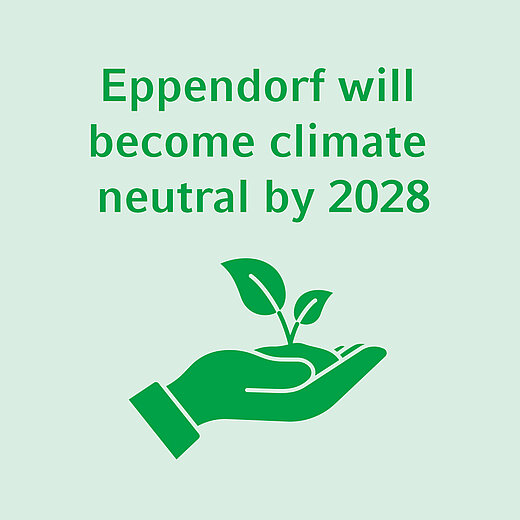Eppendorf: climate-neutral by 2028

- Comprehensive climate strategy with the goal of climate neutrality by 2028
- Successful start of implementation at all locations worldwide
- Results of initial measures already visible
Hamburg, July 25, 2022 – The globally positioned Eppendorf Group, a life science specialist, is picking up speed when it comes to climate protection. The company is reducing its CO2 emissions and will be climate-neutral by 2028 – much earlier than specified by the EU. To enable this, Eppendorf has developed a company-wide climate strategy with numerous measures for reducing its CO2 emissions.
“With our climate strategy, we will make Eppendorf climate-neutral by 2028. With this step, we will voluntarily be much faster than many other companies and will then already fulfill the goals of the EU Climate Law, which aim for climate neutrality by 2050,” says Co-CEO Eva van Pelt. “This is how we are meeting our responsibility to society and the environment as a global player and a company that acts sustainably.”
Climate strategy offers solutions
Eppendorf has anchored the core topic of sustainability in its corporate strategy as a significant factor. Active in 33 countries around the world, the company has defined clear requirements to make the entire Group, including its partner companies Starlab and USA Scientific, climate-neutral as fast as possible.
“Our climate strategy contains an overarching concept as the basis for converting the energy supply of all of our locations worldwide to renewable energies. We are also raising the climate standards for new buildings and optimizing energy efficiency in our existing buildings to substantially reduce consumption,” says van Pelt, explaining the measures. “Moreover, we are reducing our volume of air freight, reorganizing our vehicle fleet for climate neutrality and promoting environmentally friendly travel.” Calculations show that with these measures, CO2 emissions will drop to their lowest possible level by 2028.
Support for climate protection projects
However, even a comprehensive package of measures cannot completely avoid the production of CO2 emissions by today’s standards. Eppendorf compensates for its remaining greenhouse gases with the purchase of CO2 certificates associated with climate protection projects, such as those pursuing the expansion of solar electricity, biogas plants or hydropower. At the same time, Eppendorf is working intensively to identify further opportunities to reduce its remaining volume of greenhouse gases.
Initial successes are already visible
Eppendorf actively sought to reduce its CO2 emissions even before it began to implement its new climate strategy. For some time now, all its German sites as well as the plants in Enfield, Connecticut, U.S., and Maldon, England, have relied on CO2-neutral electricity from renewable energy sources, with the result that emissions in 2021 sank by a clear 57 percent in comparison with the year before. The Eppendorf vehicle fleet is changing, too. About 15 percent of all its vehicles in Germany run on purely electrical power. The effect of this measure is that our fleet CO2 emissions in Germany have fallen from 120g/km at the end of 2020 to 85g/km today, and they will continue to drop significantly.
Supporting member of the KlimaWirtschaft Foundation
Despite all the measures taken, the fact remains that companies can only achieve the urgent need to cut CO2 emissions on a large scale by working together. For this reason, Eppendorf has been a supporting member of the KlimaWirtschaft Foundation since July, supplementing the association of renowned German companies with expertise from the life science sector. The goal of the non-profit foundation is to promote climate protection and the sustainable use of natural resources. To this end, the foundation approaches politicians and actively participates in debates on climate policy. It identifies concrete opportunities for the transition to climate neutrality and makes proposals for the necessary political framework.
One success factor is solid data
An important factor in successfully implementing Eppendorf’s climate strategy is its Sustainability Report, which enables valid statements on the success of the company’s environmental and sustainability measures by collecting and comparing extensive amounts of data – for instance on the company’s CO2 emissions and energy consumption. “With this data, we have created a reliable foundation for moving ahead at full speed toward climate neutrality,” says van Pelt.
About Eppendorf
Eppendorf is a leading life science company that develops and sells instruments, consumables and services for liquid, sample and cell handling in laboratories worldwide. Divided into the business units Liquid Handling, Consumables, Separation & Instrumentation, Bioprocess and Workflow Solutions, the product portfolio includes, for example, pipettes, pipette tips, centrifuges, mixers and ultra-low temperature equipment. In addition, Eppendorf offers a wide range of high-quality consumables.
Eppendorf products are most broadly used in academic and commercial research laboratories, e.g., in companies from the pharmaceutical and biotechnological as well as the chemical and food industries. They are also used in laboratories that perform clinical or environmental analysis, in forensic laboratories and in industrial laboratories where process analysis, production and quality assurance are performed.
Eppendorf has been active since 1945, is headquartered in Hamburg, Germany, and employs about 5,000 employees worldwide. The Group has subsidiaries in 33 countries and is represented in all other continents and important markets by distributors.
Media contact:
Christiane Klebig
Eppendorf SE
Barkhausenweg 1
22339 Hamburg
Phone: +49 40 538 01-183
Mail: klebig.c@eppendorf.de
